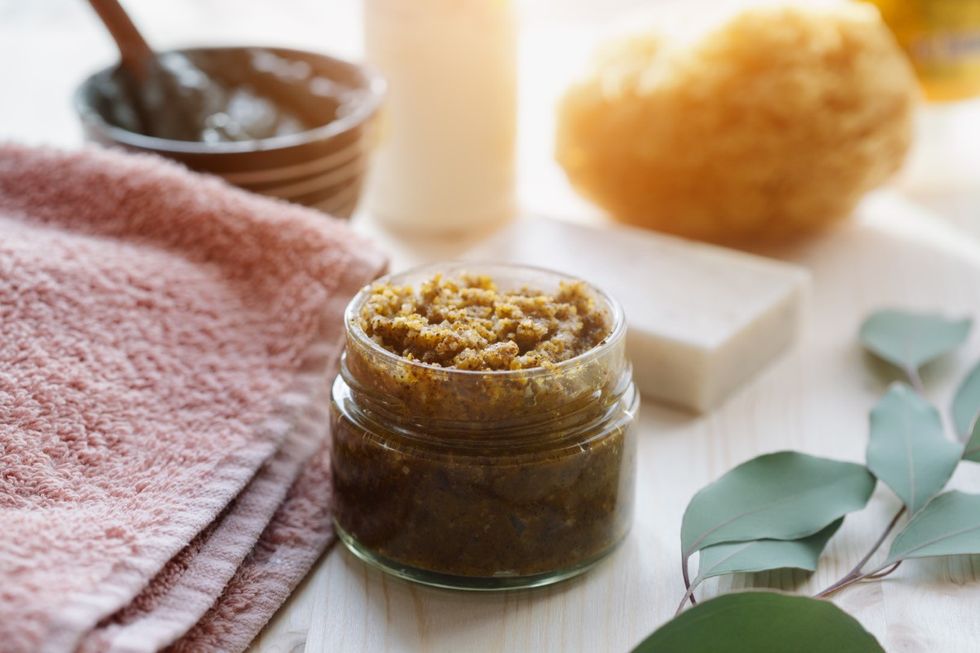A good, consistent skincare routine is key to clear, glowing skin at any age, but using the wrong products or ignoring key ingredients that trigger inflammation could be speeding up your skin’s aging process. If your skin is dry, flaky, dull, and itchy, your face wash could be doing more harm than good. “It’s advantageous for a cosmetics company to sell consumers more products in a skin care line,” says Rachel Reynolds, MD, interim chair of dermatology at Harvard-affiliated Beth Israel Deaconess Medical Center, via Harvard Health. “But it’s buyer beware, because this is a completely unregulated market, and cosmetic companies can make claims that don’t have to be substantiated in actual clinical trials.” Here are the signs your skincare routine and cleanser is aging you, according to experts.
RELATED: Dermatologist Shares Her Drugstore Skincare Routine.
Over-Exfoliation Could Be Ruining Your Skin
Shutterstock
Over-exfoliating is one of the worst things you can do for skin, causing damage and premature aging. “People overdo it with exfoliants,” board-certified dermatologist Camila Antia, MD, tells AARP. “If you over-exfoliate, you can make your skin look dull and a little older than it actually is, so you want to stick with gentle exfoliating methods. Your skin doesn’t need to get polished every single day. You want to do it once a week, and if you have sensitive skin, you might do it once every two weeks or so.”
Chemical and Physical Exfoliation

There are two ways to exfoliate—chemical, and physical. “Mechanical exfoliation can improve skin luster by taking off a dead layer of skin that can make it look dull,” Dr. Reynolds says. “And it can help unclog pores a bit, which can reduce some types of acne. Chemical exfoliants work on a more micro-level to help dissolve excess skin cells and reduce uneven pigmentation sitting at the surface of the skin. They also restore skin glow, improve acne, and give the skin a little more shine.”
Stripping Skin Oil

Over-exfoliating can strip the skin of natural oils, causing breakouts and skin discomfort. “Over-exfoliating is very common. If some is good, then more must be better, right? No!” dermatologist Robyn Gmyrek, MD, tells CVS. “Over-exfoliating damages the skin barrier, which helps keep the skin balanced, nourished and protected from environmental factors.”
Reassess Your Exfoliation Routine

If you’ve irritated your skin through over-exfoliation, take a break and let the skin heal. “We lose 50 million dead skin cells a day, so [exfoliation] is an essential part of a skin routine,” board-certified dermatologist Mona Gohara tells Allure. “One bad exfoliating experience doesn’t mean canceling this beauty essential for life. It just means a break is warranted.”
RELATED: Ectoin Is the New Weapon for Healthier, Younger-Looking Skin.
Talk To An Expert

If you want to know more about which exfoliation is best for your skin type, it might be worth talking to an expert. “You may notice things like dry patches, fine lines and wrinkles, as well as hyperpigmentation as you get older,” aesthetician Christina Smith tells the Cleveland Clinic. “It’s important to discuss all of these options with your dermatologist or skin care specialist because too much exfoliation can cause sensitivity or irritation for certain skin types. There is a proper exfoliation treatment protocol for even the most sensitive skin.”
Buyer Beware
Shutterstock
While careful exfoliation may have some benefits, beware of exaggerated beauty claims made by skincare companies. “I don’t think exfoliation is going to fix anybody’s wrinkles,” says Dr. Reynolds. “Nothing happens if you don’t exfoliate — you just walk around with bumpy or slightly dry skin, which is inconsequential except for cosmetic reasons. No one has to exfoliate, but it can be helpful to exfoliate the arms and legs. As we age, these areas get more dry than other parts of the body, and people notice they build up a lot more flaking skin and an almost fish-scale appearance.”


